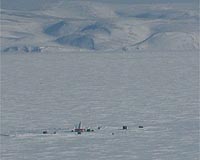| . |  |
. |
Nuuk, Greenland (AFP) June 21, 2009 Inuit choirs gathered around the port of Greenland's capital sang traditional songs Sunday to welcome a new era of self rule after 300 years under Danish authority. The prospect of global warming opening up access to Greenland's potentially rich oil and mineral wealth put an international spotlight on the ceremonies, which saw thousands of the island's 57,000 citizens gather at the port of Nuuk. Denmark's Queen Margrethe and her husband, Prince Henrik, were strongly applauded as they walked in Inuit traditional costume to a church that overlooks the port for a service of commemoration. The queen was to hand over the decree setting out the Greenland government's new powers to the head of the Landsting, Greenland's local parliament. Greenland's Prime Minister Kuupik Kleist said in a speech: "This morning we awoke with new hope in our heart. "From today we are starting a new era in the history of our country, a new era full of hope and possibilities." He added that "other countries have obtained self-determination often through making a lot of sacrifices," but Greenland has secured it "through dialogue, mutual comprehension and reciprocal respect" with Denmark. Asked later about a possible step from self rule to independence, he told reporters: "We will be independent I'm sure, if the people want it. But it's not on the agenda of my government for the next four years." Danish premier Lars Loekke Rasmussen said he hoped Greenland would choose to stay a part of Denmark. "The question of independence is not an issue today, but it's totally up to Greenlandic people themselves to decide whether they wish to be a part of the Danish kingdom or whether they wish to establish an independant state." Greenland's new status took effect as it celebrated its national day six months after 75 percent of voters approved a referendum demanding more power and control of its vast natural resources of gas, gold, diamonds and oil. Denmark granted Greenland limited sovereignty when its parliament approved home rule in 1979. US scientists believe Greenland's northern tip is especially rich in oil and gas. They say global warming could help unlock the untapped wealth under the ice-cap and provide a solid foundation for an independent economy. If it proves to be "sufficiently large to prop up the island's economy", Greenland will be well on the road to full independence from Denmark, said Lars Hovbakke Soerensen, a historian at the University of Aarhus in Denmark. Greenland, which holds 10 percent of the world's freshwater reserves, is one of the areas most under threat from global warming, which will affect its lucrative fishing industry. That will force political leaders to look underground in a bid to diversify the economy and cut its reliance on the former colonial master for funding. Under the self-rule agreement, Greenlanders are recognised as a distinct people with the right to self-determination. Greenlandic will become the territory's official language. As it begins self-rule, the island has also entered a new political era. The social democratic Siumut party was ousted from power after 30 years amid allegations of misuse of public funds and corruption. Spurred on by deepening social and economic problems, voters rebelled against Siumut, putting the more left-wing Inuit Ataqatigiit (Community of the People) party into power with some 44 percent of votes. Greenland is rife with social problems, such as alcoholism. One child in three is a victim of domestic violence and has bad living conditions. Inuit Ataqatigiit, which ultimately wants complete independence from Denmark, is led by 51-year-old intellectual Kleist who has vowed initially to improve public services. Kleist has formed a coalition with two centrist parties, the Demokratiit (Democrats) and the Kattusseqatigiit Partiiat (Candidate List Party). Between them, they hold a total of 19 seats in the 31-seat parliament.
Share This Article With Planet Earth
Related Links Beyond the Ice Age
 Drilled Cores Yield Unique Arctic Climate Data
Drilled Cores Yield Unique Arctic Climate DataAmherst MA (SPX) Jun 12, 2009 A team of scientists from the United States, Germany, Russia and Austria returned recently from a six-month sediment drilling expedition at a frozen lake in Siberia, where they retrieved cores going back further than ever before collected in the Arctic-information they call "of absolutely unprecedented significance." Data will help scientists to understand the region's geologic climate ... read more |
|
| The content herein, unless otherwise known to be public domain, are Copyright 1995-2009 - SpaceDaily. AFP and UPI Wire Stories are copyright Agence France-Presse and United Press International. ESA Portal Reports are copyright European Space Agency. All NASA sourced material is public domain. Additional copyrights may apply in whole or part to other bona fide parties. Advertising does not imply endorsement,agreement or approval of any opinions, statements or information provided by SpaceDaily on any Web page published or hosted by SpaceDaily. Privacy Statement |